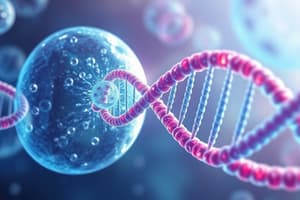Podcast
Questions and Answers
All cells are derived from pre-existing cells.
All cells are derived from pre-existing cells.
True (A)
What must happen to DNA before cell division?
What must happen to DNA before cell division?
DNA must be copied or replicated.
How many chromosomes do human body cells have?
How many chromosomes do human body cells have?
- 23
- 10
- 50
- 46 (correct)
The DNA of prokaryotes is a single, __________ chromosome.
The DNA of prokaryotes is a single, __________ chromosome.
What process do prokaryotes use to divide?
What process do prokaryotes use to divide?
Which of the following phases is NOT part of the cell cycle?
Which of the following phases is NOT part of the cell cycle?
What are duplicated chromosomes called?
What are duplicated chromosomes called?
What is the function of the mitotic spindle?
What is the function of the mitotic spindle?
Cytokinesis means the division of the nucleus.
Cytokinesis means the division of the nucleus.
What happens to chromosomes during the telophase stage of mitosis?
What happens to chromosomes during the telophase stage of mitosis?
A karyotype is a picture of the __________ from a human cell arranged in pairs by size.
A karyotype is a picture of the __________ from a human cell arranged in pairs by size.
Which stage follows the S phase in the cell cycle?
Which stage follows the S phase in the cell cycle?
Mitosis occurs in both prokaryotic and eukaryotic cells.
Mitosis occurs in both prokaryotic and eukaryotic cells.
Study Notes
Cell Division Overview
- Cells arise only from pre-existing cells.
- New cells are essential for growth and replacing damaged or aging cells.
- Cell division mechanisms differ between prokaryotes (bacteria) and eukaryotes (plants, animals, fungi, protists).
Maintaining Genetic Consistency
- DNA encodes the necessary instructions for creating cell components; it must be fully replicated for each new cell.
DNA Replication
- Prior to cell division, DNA replication ensures identical copies of DNA in daughter cells.
Prokaryotic Chromosomes
- Prokaryotic DNA consists of a single, circular chromosome attached to the cell membrane.
Eukaryotic Chromosomes
- Eukaryotic cells store genetic information in multiple chromosomes.
- Most eukaryotic organisms have 10 to 50 chromosomes in body cells.
- Humans have 46 chromosomes, organized into 23 pairs.
- Chromosomes are made of a single, tightly coiled DNA molecule and are visible only during cell division as chromatin when cells are not dividing.
Compacting DNA
- DNA coils tightly around proteins known as histones for compact storage in the form of chromosomes.
Cell Division Structure
- Duplicated chromosomes (chromatids) are connected at the centromere during division.
Karyotype Definition
- Karyotypes are photographic representations of chromosomes arranged by size.
- The first 22 pairs are autosomes, while the 23rd pair denotes sex chromosomes (XX for female, XY for male).
Types of Cell Reproduction
- Asexual reproduction involves one cell dividing to form two identical daughter cells; examples include mitosis and binary fission.
- Sexual reproduction combines two cells (egg and sperm) to generate a zygote that is genetically distinct from the parent cells; meiosis serves as an example.
Prokaryotic Cell Division
- Prokaryotes undergo binary fission to reproduce, where a single chromosome duplicates and the cell wall forms between the two copies to divide the cell.
The Cell Cycle Phases
- G1 Phase: Primary growth phase where the cell matures and increases cytoplasm and organelles.
- S Phase: Synthesis phase where DNA replication occurs.
- G2 Phase: Secondary growth phase for preparing cell structures necessary for division.
- M Phase: Mitosis phase for nuclear division.
- C Phase: Cytokinesis phase, dividing the cytoplasm.
Interphase Stages
- G1 Stage: First growth phase post-division, engaging in metabolic activities.
- S Stage: DNA synthesis and replication occurs.
- G2 Stage: Pre-division preparations are completed, including the formation of organelles and proteins.
Mitosis Overview
- Mitosis refers to nuclear division (karyokinesis) distinctly in eukaryotic cells.
- It consists of four main stages and does not take place in certain cells, such as neurons.
Stages of Mitosis
- Metaphase: Chromosomes align at the cell's equator; kinetochore fibers connect chromosomes to spindle apparatus.
- Anaphase: Sister chromatids separate and are pulled toward opposite cell poles by kinetochore fibers.
- Telophase: Chromosomes reach poles, the nuclear envelope re-forms around each set, spindle fibers disassemble, and cytokinesis follows.
Cytokinesis Details
- Cytokinesis is the cytoplasm division resulting in two identical daughter cells.
- In plant cells, a cell plate forms; in animal cells, a cleavage furrow develops.
Daughter Cells from Mitosis
- Daughter cells exhibit identical chromosome numbers and resemble parent cells, albeit being smaller; they grow in size during G1 of interphase.
Uncontrolled Mitosis Consequences
- Lack of mitotic regulation can lead to uncontrolled cell division, contributing to cancerous tumor formation.
Studying That Suits You
Use AI to generate personalized quizzes and flashcards to suit your learning preferences.
Related Documents
Description
Explore the fundamental processes of cell division, including how all cells originate from pre-existing cells. Learn about the differences between prokaryotic and eukaryotic cell division and the importance of DNA replication in maintaining genetic consistency. This quiz covers key concepts essential for understanding cellular biology.




